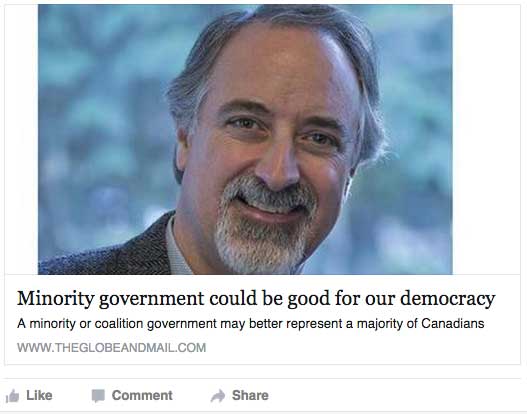
Political articles like this get shared on Facebook a lot, but what happened to having a real discussion?
With the federal election looming ahead next week, social media is filled with opinions, photos, links, videos, and profile pictures regarding the candidates. Whether anti- or pro-Conservative, NDP, Liberal, Green, or anything else, it feels like everybody is establishing their point of view by sharing content on Facebook and Twitter. But does this actually effectively establish your position on government-based issues?
Theoretically speaking, yes. As Facebook is a public sphere, it provides a platform for communicating issues relating to the federal election that are of importance to you, the voter. You are able to share content with a brief comment on your stance on a particular issue. This then opens up an opportunity for a dialogue between you and your friends, family, and acquaintances. Whether or not you share the same political beliefs, the open debate still effectively provides awareness and recognition of the surrounding platforms of the candidates.
However, when sharing a quote or photo that you come across — regardless of your position — there is no actual immersion in the issue. Often, the content simply takes a piece out of context. Do you know the reasoning behind why something was stated? Do you understand the issue at play, fully? By simply hitting “share,” a real opinion is unable to form. If there is no research beyond what someone posted on Facebook, are you necessarily reflecting your own point of view?
Additionally, posting a piece of content created by someone else does not clearly indicate your opinions nor establish your position on the specific issue that the content covers. Yes, you are sharing content. Yes, you may agree with something the respective creator presented. But what are your thoughts? What is it about the content that stood out for you? Do you agree or disagree? By simply sharing the content, there really is no depth in it. You are not reflecting on it. It is just another post within a user’s feed.
Although presenting your perspective on political issues by means of sharing content can create a dialogue online, there is a limited impact on the election results. Increasing awareness of issues is definitely positive; however, there is not a clear indication that this will make a difference in the polls. Is there anything more effective in terms of voicing who you want to win?
According to Elections Canada, only 38.8 per cent of eligible voters between the ages of 18 to 24, and 45.1 per cent of eligible voters between the ages of 25 to 34, actually exercised their right to vote during the 2011 federal election. If you want your point of view to actually come across, you need to go out to vote in your respective ridings on October 19, 2015. After all, that is what really matters — not just a miniscule “like” or “share.”


